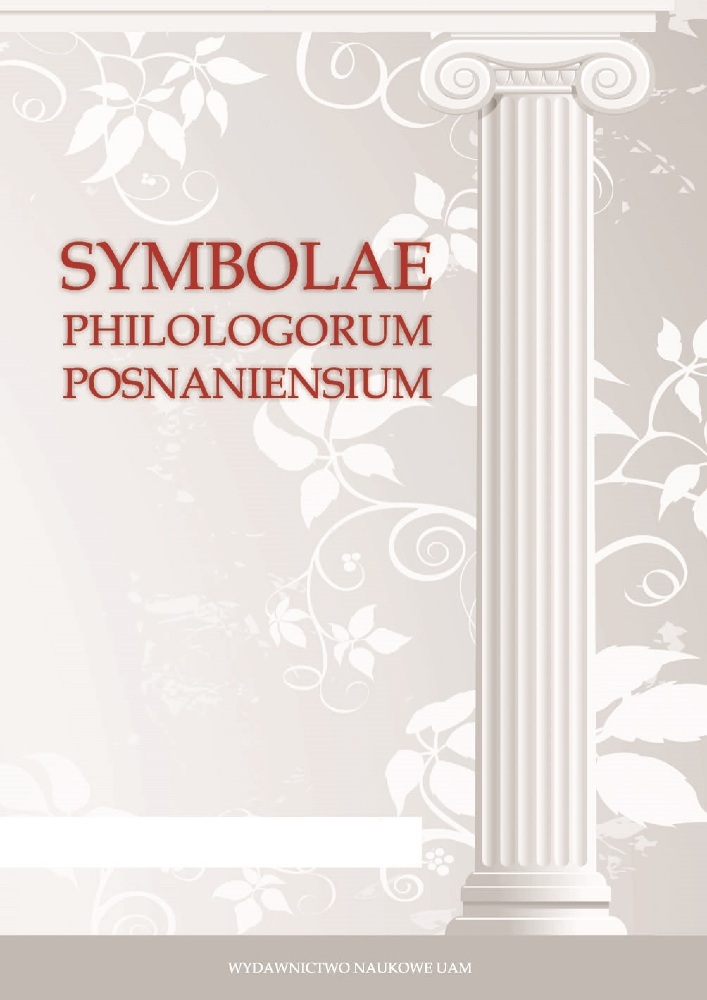Abstrakt
Plato who is an excellent expert of the human nature, makes the subject of his interest the old age and the life of the people of advanced age as well. The reflection on the fate of the old people is not the main subject of deliberation in the Plato’s dialogues but appears mainly in the context of the social and political conception of the ideal state. The issues connected with the life and function of the old people in social structures are the subject of the discussion e.g. in the Laws. Plato presents not only his theoretical deliberation about the old age but also makes the old men the interlocutors in his dialogues to depict the portrait of the members of the oldest social group and to portrait their attitude to life and the passing of time. Cephalus who resigned himself to his fate in the Republic, three old men who make an effort to enact the just code of laws in the Platonic Laws, or old Socrates, who in the Crito and Phaedo waits for the death penalty, faithful to his ideals to the end of his days. These are only a few examples of the elderly people, presented by philosopher, who become embedded in the memory of the readers of the Platonic dialogues. The aim of this article is to provide the answers to the questions, how is the old age perceived by Plato and what social role the elderly people fulfill in his idealisticconception of the state. I will also consider the way in which Plato portrayed the old people who were the main characters in the Republic and Laws.
Bibliografia
Adam 1969: J. Adam, The Republic of Plato, edited with Critical Notes, Commentary and Appendices by J. Adam, Cambridge 1969.
Améry 2007: J. Améry, O starzeniu się. Bunt i rezygnacja, przełożył i przedmową poprzedził B. Baran, Warszawa 2007.
Annas 1991: J. Annas, An Introduction to Plato’s “Republic”, Oxford 1991.
Bobonich 2000: Ch. Bobonich, Reading the “Laws”, in: Form and Argument in Late Plato, ed. by Ch. Gill, M. McCabe, Oxford 2000, s. 249–282.
Burnet 1902: Platonis Opera, recognovit brevique adnotatione critica instruxit I. Burnet, t. V, Oxonii 1902.
Emlyn-Jones 2007: Plato, Republic 1-2. 368c4, with Introduction, Translation and Commentary by C. Emlyn-Jones, Oxford 2007.
Ferrari, Poli 2005: Platone, Le Leggi, introduzione di F. Ferrari, premessa al testo di S. Poli, traduzione di F. Ferrari e S. Poli, note di S. Poli, Milano 2005.
Głodowska 2008: A. Głodowska, Sceny rodzajowe i ich funkcja w „Politei” Platona, „Collectanea Philologica” XI (2008), 129–145.
Głodowska 2009: A. Głodowska, Come vivere per godersi la vecchiaia; analisi della conversazione di Socrate e Cefalo (Pl. Rep. 328b – 331d), „Symbolae Philologorum Posnaniensium Graecae et Latinae” XIX (2009), 51–61.
Hansen 1999: M.H. Hansen, Demokracja ateńska w czasach Demostenesa. Struktura, zasady i ideologia, przełożył R. Kulesza, Warszawa 1999.
Jaeger 2001: W. Jaeger, Paideia, przełożyli M. Plezia i H. Bednarek, Warszawa 2001.
Kulesza 2003: R. Kulesza, Sparta w V-IV wieku p.n.e., Warszawa 2003.
Maykowska 1997: Platon, Prawa, tłumaczenie i opracowanie M. Maykowska, wstęp T. Kozłowski, Warszawa 1997.
Nails 2002: D. Nails, The People of Plato. A P rosopography of Plato and other Socratics, Indianapolis–Cambridge 2002.
Sowa 2011: J. Sowa, „Pieśniarze Dionizosa” i śpiewak Apollona” – dwie wizje idealnej starości w dialogach Platona, „Collectanea Philologica” XIV (2011), 23–33.
Vegetti 1998: Platone, La Repubblica, traduzione e commento a cura di M. Vegetti, vol. I, Napoli 1998.
Voegelin 2009: E. Voegelin, Platon, przełożyła A. Legutko-Dybowska, Warszawa 2009.
Witwicki 2003: Platon, Państwo, przełożył, wstępem i komentarzami opatrzył W. Witwicki, Kęty 2003.
Wróblewski 1972: W. Wróblewski, Arystokratyzm Platona, Warszawa – Poznań 1972.
Zygmuntowicz 2011: D. Zygmuntowicz, Praktyka polityczna. Od „Państwa” do „Praw” Platona, Toruń 2011.
Licencja
